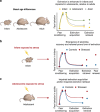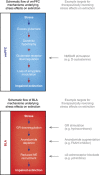Stress and Fear Extinction
- PMID: 26105142
- PMCID: PMC4677122
- DOI: 10.1038/npp.2015.180
Stress and Fear Extinction
Abstract
Stress has a critical role in the development and expression of many psychiatric disorders, and is a defining feature of posttraumatic stress disorder (PTSD). Stress also limits the efficacy of behavioral therapies aimed at limiting pathological fear, such as exposure therapy. Here we examine emerging evidence that stress impairs recovery from trauma by impairing fear extinction, a form of learning thought to underlie the suppression of trauma-related fear memories. We describe the major structural and functional abnormalities in brain regions that are particularly vulnerable to stress, including the amygdala, prefrontal cortex, and hippocampus, which may underlie stress-induced impairments in extinction. We also discuss some of the stress-induced neurochemical and molecular alterations in these brain regions that are associated with extinction deficits, and the potential for targeting these changes to prevent or reverse impaired extinction. A better understanding of the neurobiological basis of stress effects on extinction promises to yield novel approaches to improving therapeutic outcomes for PTSD and other anxiety and trauma-related disorders.
Figures






References
-
- Abrari K, Rashidy-Pour A, Semnanian S, Fathollahi Y (2008). Administration of corticosterone after memory reactivation disrupts subsequent retrieval of a contextual conditioned fear memory: dependence upon training intensity. Neurobiol Learn Mem 89: 178–184. - PubMed
Publication types
MeSH terms
Grants and funding
LinkOut - more resources
Full Text Sources
Other Literature Sources
Medical

